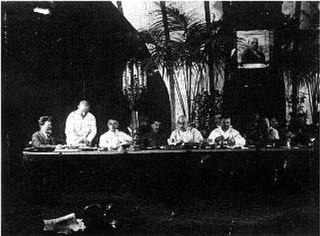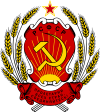
The Transcaucasian Socialist Federative Soviet Republic, also known as the Transcaucasian Soviet Federative Socialist Republic, or simply Transcaucasia, was a republic of the Soviet Union that existed from 1922 to 1936.

The Russian Soviet Federative Socialist Republic, previously known as the Russian Soviet Republic and the Russian Socialist Federative Soviet Republic, as well as being unofficially referred to as Soviet Russia, the Russian Federation, or simply Russia, was an independent federal socialist state from 1917 to 1922, and afterwards the largest and most populous constituent republic of the Soviet Union (USSR) from 1922 to 1991, until becoming a sovereign part of the Soviet Union with priority of Russian laws over Union-level legislation in 1990 and 1991, the last two years of the existence of the USSR. The Russian SFSR was composed of sixteen smaller constituent units of autonomous republics, five autonomous oblasts, ten autonomous okrugs, six krais and forty oblasts. Russians formed the largest ethnic group. The capital of the Russian SFSR and the USSR as a whole was Moscow and the other major urban centers included Leningrad, Stalingrad, Novosibirsk, Sverdlovsk, Gorky and Kuybyshev. It was the first socialist state in the world.
The Politburo of the 28th Congress of the Communist Party of the Soviet Union was in session from 1990 to 1991.

The Declaration and Treaty on the Formation of the Union of Soviet Socialist Republics officially created the Union of Soviet Socialist Republics (USSR), commonly known as the Soviet Union. It de jure legalised a political union of several Soviet republics that had existed since 1919 and created a new federal government whose key functions were centralised in Moscow. Its legislative branch consisted of the Congress of Soviets of the Soviet Union and the Central Executive Committee of the Soviet Union (TsIK), while the Council of People's Commissars composed the executive.
The Presidium of the 19th Congress of the Communist Party of the Soviet Union (CPSU) was in session from 1952 to 1956.
The Secretariat of the 27th Congress of the Communist Party of the Soviet Union (CPSU) was in session from 1986 to 1990.
The Secretariat of the 26th Congress of the Communist Party of the Soviet Union (CPSU) was in session from 1981 to 1986.
The Secretariat of the 25th Congress of the Communist Party of the Soviet Union (CPSU) was in session from 1976 to 1981.
The Central Committee (CC) composition was elected by the 8th Congress, and sat from 23 March 1919 until 5 April 1920. The CC 1st Plenary Session renewed the composition of the Politburo, Secretariat and the Organizational Bureau (OB) of the Russian Communist Party (Bolsheviks).

The Central Committee (CC) composition was elected by the 9th Congress, and sat from 5 April 1920 until 16 March 1921. The CC 1st Plenary Session renewed the composition of the Politburo, Secretariat and the Organizational Bureau (OB) of the Russian Communist Party (Bolsheviks).
The Central Committee (CC) composition was elected by the 7th Congress, and sat from 8 March 1918 until 23 March 1919. The CC 1st Plenary Session renewed the composition of the Bureau, Secretariat and the Organizational Bureau (OB) of the Russian Communist Party (Bolsheviks).

The Central Committee (CC) composition was elected by the 10th Congress, and sat from 16 March 1921 until 2 April 1922. The CC 1st Plenary Session renewed the composition of the Politburo, Secretariat and the Organizational Bureau (OB) of the Russian Communist Party (Bolsheviks).

The Central Committee (CC) composition was elected by the 11th Congress, and sat from 2 April 1922 until 25 April 1923 . The CC 1st Plenary Session renewed the composition of the Politburo, Secretariat and the Organizational Bureau (OB) of the Russian Communist Party (Bolsheviks).
The Central Committee (CC) composition was elected by the 6th Congress, and sat from 3 August 1917 until 8 March 1918. The CC 1st Plenary Session established the Narrow Composition (abolished October 1917), the Politburo (abolished November 1917) and the Bureau (established in November 1917), while sanctioning the establishment of the Secretariat on the orders of the Narrow Composition.
The Secretariat of the 28th Congress of the Communist Party of the Soviet Union (CPSU) was in session from 1990 to 1991.

The Central Committee (CC) composition was elected by the 12th Congress, and sat from 25 April 1923 until 31 May 1924. The CC 1st Plenary Session renewed the composition of the Politburo, Secretariat and the Organizational Bureau (OB) of the Russian Communist Party (Bolsheviks).

The Central Committee (CC) composition was elected by the 13th Congress, and sat from 2 June 1924 until 31 December 1925. The CC 1st Plenary Session renewed the composition of the Politburo, Secretariat and the Organizational Bureau (OB) of the All-Union Communist Party (Bolsheviks).
The Central Committee (CC) composition was elected by the 14th Congress, and sat from 31 December 1925 until 19 December 1927. The CC 1st Plenary Session renewed the composition of the Politburo, Secretariat and the Organizational Bureau (OB) of the All-Union Communist Party (Bolsheviks).

The Central Committee (CC) composition was elected by the 15th Congress, and sat from 19 December 1927 until 13 July 1930. The CC 1st Plenary Session renewed the composition of the Politburo, Secretariat and the Organizational Bureau (OB) of the All-Union Communist Party (Bolsheviks).
The Central Committee (CC) composition was elected by the 16th Congress, and sat from 13 July 1930 until 10 February 1934. Its 1st Plenary Session elected the Politburo, Secretariat and Orgburo. The 16th Congress was the first party convention since the 13th Congress which saw no organized opposition, and the first congress in party history in which there was no opposition to the party leadership. Ukrainian historian Oleg Khlevniuk considers the period 1930–1934 to be a "transitional period" between collective leadership (referred to interchangeably by him as oligarchy) and Joseph Stalin's personal dictatorship (autocracy). The removal of Alexei Rykov, the Chairman of the Council of People's Commissars (SNK, the Soviet government), from the Politburo at the 1st Joint Plenary Session of the CC and the Central Control Commission (CCC) has been marked in historic literature as "the definitive Stalinization of that body [Politburo]" according to Khlevniuk.




























